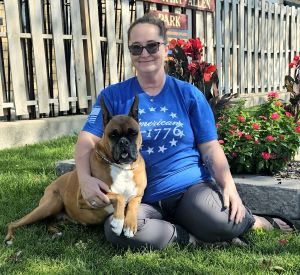Participation Matters
“If responsible dog breeders do not participate in health research - we will never move forward, we will always have these health problems.”
Julie Higgins, Envision Boxers

This desire to improve Boxer health and a wish that no more dogs and owners should have to experience the agony of degenerative myelopathy (DM) are what motivated Boxer breeder Julie Higgins to participate in a clinical trial with her dog Sophia.
Degenerative Myelopathy (DM) is a progressive, degenerative disease of the nervous system in dogs. Clinical signs appear later in life and include worsening weakness and paralysis starting in the rear limbs and progressing to involve the front limbs, swallowing muscles, and diaphragm. There is no definitive treatment for the disease.
A life-long dog lover and fancier, Julie showed various breeds as a junior and worked for professional handlers to improve her skills and knowledge. After a break to start her human family, she chose to breed and show Boxers, acquiring her foundation bitch in 2008. “I had to come up with a kennel name,” Julie said. “After a lot of thinking, I always want to keep in mind what I ‘envision’ a good boxer to be. So, Envision Boxers it was!”

Fast forward to Sophia, an independent, ‘queen of the household’ Boxer with a successful conformation show career and breeding history. In 2022, at eight years of age, Sophia started losing muscle tone, dragging her rear feet, and losing her balance. Julie knew that Sophia’s genetic status put her ‘at risk’ for DM and recognized these common clinical signs of the disease. “You could see it in her eyes that she was confused and upset that she couldn't do what she wanted to do,” Julie noted. Thankfully, a social media post alerted Julie of a clinical trial for dogs with DM at the nearby University of Missouri College of Veterinary Medicine.
The clinical trial is evaluating the medication riluzole as an option to slow disease progression in dogs with DM. This drug has been used to treat amyotrophic lateral sclerosis (ALS or Lou Gehrig’s disease), a human disease with characteristics similar to DM. The trial is being conducted at several US veterinary schools with funding from AKC Canine Health Foundation (CHF) Grant 03139: Riluzole as a Neuroprotectant in Canine Degenerative Myelopathy. Goals of the study are to evaluate dosing and safety, assess clinical efficacy, and demonstrate use of a biomarker to assess disease progression.
Julie recounts their experience: “I left Sophia overnight with the staff at the University of Missouri and their Neurology Department to run various tests such as MRI, radiographs, and more to get a baseline on her and confirm she would be a good candidate for the study. I picked her up the next day and was told that she was a great candidate. We were sent home with medication to start the next day. I was hopeful this would work, but was also very scared and concerned of the unknown, hoping that we would have no issues. After a few days we noticed slight improvements in her condition. After about a week, she was running, playing, and had her spark back!” (You can read more about Julie and Sophia’s experience and view videos of her before and after treatment on the Envision Boxers Facebook page here.)
Unfortunately, after two months of participation, Sophia’s liver enzymes were elevated and continued to rise despite adjustments to her dosing schedule. The decision was made to stop the medication and remove Sophia from the clinical trial. “While the neurologist and I are disappointed that we didn’t get the results we wanted, we know that we at least got some good information,” Julie says. “It may help other dogs or future Boxer litters bred by myself and others.”
Sophia continued to do well for three months after stopping riluzole, but clinical signs of DM started to return this summer. With more than 15 years’ experience breeding dogs, this is Julie’s first dog affected by DM. “It’s been hard to deal with physical symptoms while Sophia’s mental capacity is still good,” Julie says. “She will be 10 in January and has lived a great life. Even though she is not actively showing, she still comes along to enjoy dog shows and get attention.”
Participation in CHF-funded research, including clinical trials such as this, is critical to advance our understanding of canine disease and develop new treatment and preventive strategies. Dog owners, breeders, and veterinary professionals are encouraged to learn more and search for studies recruiting participants or sample submission at akcchf.org/participate. At a minimum, submitting DNA samples to the OFA DNA Repository provides a ready resource for canine health researchers exploring a variety of canine diseases.
As for Julie, “We cannot improve our breeds if we do not participate in these studies when available. We need more breeders to be aware of these studies and get involved.”
Thank you to Julie, Sophia, and all the researchers and study participants that help dogs live longer, healthier lives by participating in canine health research!
Related Articles
Help Future Generations of Dogs
Participate in canine health research by providing samples or by enrolling in a clinical trial. Samples are needed from healthy dogs and dogs affected by specific diseases.



